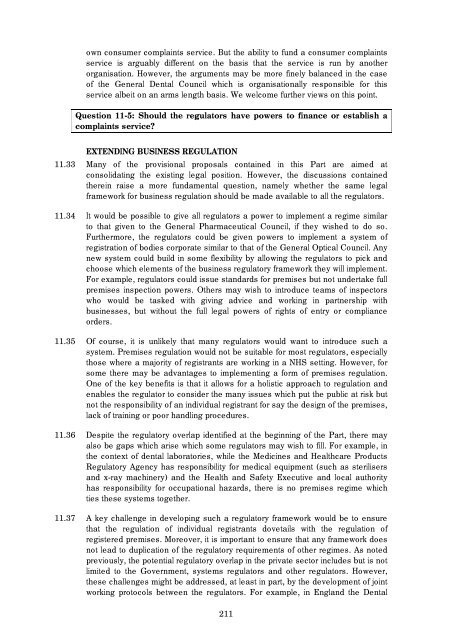Regulation of Health and Social Care Professionals Consultation
Regulation of Health and Social Care Professionals Consultation
Regulation of Health and Social Care Professionals Consultation
Create successful ePaper yourself
Turn your PDF publications into a flip-book with our unique Google optimized e-Paper software.
own consumer complaints service. But the ability to fund a consumer complaints<br />
service is arguably different on the basis that the service is run by another<br />
organisation. However, the arguments may be more finely balanced in the case<br />
<strong>of</strong> the General Dental Council which is organisationally responsible for this<br />
service albeit on an arms length basis. We welcome further views on this point.<br />
Question 11-5: Should the regulators have powers to finance or establish a<br />
complaints service?<br />
EXTENDING BUSINESS REGULATION<br />
11.33 Many <strong>of</strong> the provisional proposals contained in this Part are aimed at<br />
consolidating the existing legal position. However, the discussions contained<br />
therein raise a more fundamental question, namely whether the same legal<br />
framework for business regulation should be made available to all the regulators.<br />
11.34 It would be possible to give all regulators a power to implement a regime similar<br />
to that given to the General Pharmaceutical Council, if they wished to do so.<br />
Furthermore, the regulators could be given powers to implement a system <strong>of</strong><br />
registration <strong>of</strong> bodies corporate similar to that <strong>of</strong> the General Optical Council. Any<br />
new system could build in some flexibility by allowing the regulators to pick <strong>and</strong><br />
choose which elements <strong>of</strong> the business regulatory framework they will implement.<br />
For example, regulators could issue st<strong>and</strong>ards for premises but not undertake full<br />
premises inspection powers. Others may wish to introduce teams <strong>of</strong> inspectors<br />
who would be tasked with giving advice <strong>and</strong> working in partnership with<br />
businesses, but without the full legal powers <strong>of</strong> rights <strong>of</strong> entry or compliance<br />
orders.<br />
11.35 Of course, it is unlikely that many regulators would want to introduce such a<br />
system. Premises regulation would not be suitable for most regulators, especially<br />
those where a majority <strong>of</strong> registrants are working in a NHS setting. However, for<br />
some there may be advantages to implementing a form <strong>of</strong> premises regulation.<br />
One <strong>of</strong> the key benefits is that it allows for a holistic approach to regulation <strong>and</strong><br />
enables the regulator to consider the many issues which put the public at risk but<br />
not the responsibility <strong>of</strong> an individual registrant for say the design <strong>of</strong> the premises,<br />
lack <strong>of</strong> training or poor h<strong>and</strong>ling procedures.<br />
11.36 Despite the regulatory overlap identified at the beginning <strong>of</strong> the Part, there may<br />
also be gaps which arise which some regulators may wish to fill. For example, in<br />
the context <strong>of</strong> dental laboratories, while the Medicines <strong>and</strong> <strong>Health</strong>care Products<br />
Regulatory Agency has responsibility for medical equipment (such as sterilisers<br />
<strong>and</strong> x-ray machinery) <strong>and</strong> the <strong>Health</strong> <strong>and</strong> Safety Executive <strong>and</strong> local authority<br />
has responsibility for occupational hazards, there is no premises regime which<br />
ties these systems together.<br />
11.37 A key challenge in developing such a regulatory framework would be to ensure<br />
that the regulation <strong>of</strong> individual registrants dovetails with the regulation <strong>of</strong><br />
registered premises. Moreover, it is important to ensure that any framework does<br />
not lead to duplication <strong>of</strong> the regulatory requirements <strong>of</strong> other regimes. As noted<br />
previously, the potential regulatory overlap in the private sector includes but is not<br />
limited to the Government, systems regulators <strong>and</strong> other regulators. However,<br />
these challenges might be addressed, at least in part, by the development <strong>of</strong> joint<br />
working protocols between the regulators. For example, in Engl<strong>and</strong> the Dental<br />
211
















